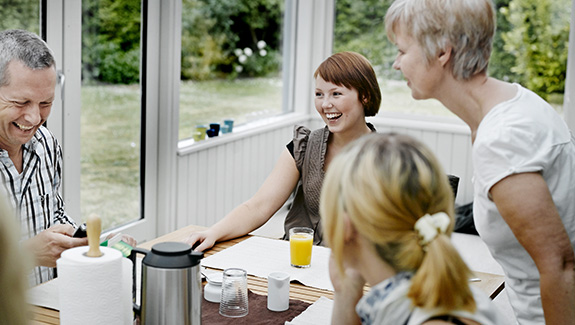Hints and Tips for Avoiding Common Food Troubles
If you have an ileostomy or a colostomy, you may experience food-related issues. Fortunately, you can prevent or minimize them by following some simple dietary guidelines.

Get tips on avoiding food troubles when living with a stoma.
People who have had ileostomy surgery or colostomy surgery may experience some food-related challenges. For example, those with ileostomies need to be careful to avoid intestinal blockage, as they may require immediate medical care. Following some simple dietary guidelines and limiting or avoiding certain foods can help prevent and minimize some common troubles. After ostomy surgery, it is recommended that you should introduce new food or drink to your diet cautiously until you know how your body reacts. Here are some additional tips:
Minimizing Gas and Odour
Intestinal gas (or “wind”) and odour can be uncomfortable and embarrassing. The good news is that you can minimize them by:
- Not swallowing air: Wind is caused not only by food, but also by swallowed air. Try to reduce or avoid carbonated beverages, smoking, chewing gum, and chewing with your mouth open. When you experience wind, you may benefit from using a stoma pouch with a filter. The filter lets the wind out of the pouch but not the odour, and prevents pouch ballooning. Filters work best if your stoma output is more formed.
- Eating less of foods that can cause wind, such as beans, beer, carbonated beverages, broccoli, Brussels sprouts, cabbage, onions, and cucumbers.
- Eating less of foods that may increase odour, such as asparagus, broccoli, Brussels sprouts, cabbage, cauliflower, eggs, fish, garlic, onions, and some spices.
For additional tips, read Eating to Prevent Odour and Gas After Ostomy Surgery.
Dealing with Diarrhoea
If your ostomy output becomes mostly liquid and there is suddenly a lot more of it, you may have diarrhoea. This could be related to the food you’re eating or the medications you’re taking. It could also be a sign of an intestinal infection.
If you find you need to empty your pouch once or more every hour, you may be losing too much bodily fluid. If you experience diarrhoea and it lasts more than 24 hours, contact a healthcare professional. In addition, you can help resolve the diarrhoea by:
- Thickening your stoma output: Eat foods that thicken stool, such as applesauce, bananas, cheese, cooked noodles, pretzels, white rice, white toast, and marshmallows.
- Avoiding foods that may increase output: Stay away from fibrous foods, raw fruits and vegetables, spicy foods, high-fat foods, caffeine, nuts, and corn.
- Avoiding dehydration: Consume more liquids, avoid foods that may increase output (see above), and drink alcohol in moderation. Replace the electrolytes your body is losing by consuming sports drinks, bananas, broths, potatoes, and crackers.
Alleviating Constipation
Everyone gets constipated, with and without a stoma. People with colostomies are more likely to suffer from constipation than those with ileostomies. You can prevent or alleviate constipation by:
- Determining the potential causes: Taking certain types of medications, not exercising enough, dealing with stress, or not getting enough fibre in your diet can all cause constipation or make it worse.
- Drinking more water: Consuming more water will help resolve your constipation. However, if you’re on a fluid-restricted diet, do not increase your water intake.
- Eating more of certain foods: Foods that can “keep things moving” through your digestive system include: bran, fresh fruits and vegetables, fresh and dried stone fruits (e.g., peaches, plums, and cherries), and whole grains.
- Eating less of certain foods: Foods that are low in fibre can cause constipation. These include many types of meat, dairy products, refined sugars, and processed or fast foods. In addition, if you’re constipated you may want to stay away from foods that thicken stool, such as applesauce, bananas, cheese, cooked noodles, pretzels, white rice, white toast, and marshmallows.
Preventing Food Blockage
If you have an ileostomy and are experiencing spasmodic abdominal pain and cramping, along with either watery diarrhoea or no stool output, this may mean that you have a bowel obstruction. Be sure to get medical care immediately. You can minimize your risk of food blockage by:
- Limiting foods that are high in fibre: It’s difficult for high-fibre foods to pass through the intestine and exit the stoma. Raw vegetables, coconut, corn, nuts, dried fruit, popcorn and other foods that contain lots of fibre have been known to cause intestinal blockage. Other foods that may cause a blockage include celery, Chinese vegetables, grapes, raisins, and mushrooms.
- Chewing your food thoroughly: Chewing releases digestive enzymes in your stomach that help break food down.
- Drinking more liquids: Liquids help break down foods into smaller particles, which aids digestion. Try to drink eight cups of water a day, if possible.
- Eat cooked fruits and vegetables: Your surgeon may have told you to eat only cooked (not raw) fruits and vegetables for six to eight weeks after surgery. Doing this can help your body adjust to the changes in digestion.
Note: If you are vomiting and have no stoma output, see your healthcare professional immediately or seek care at an emergency room.




